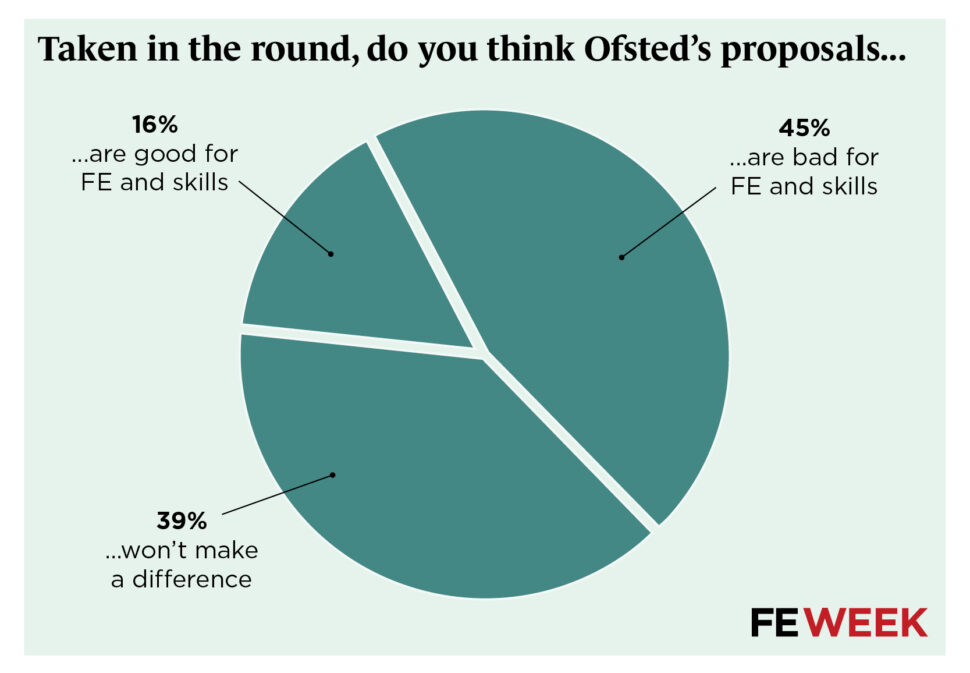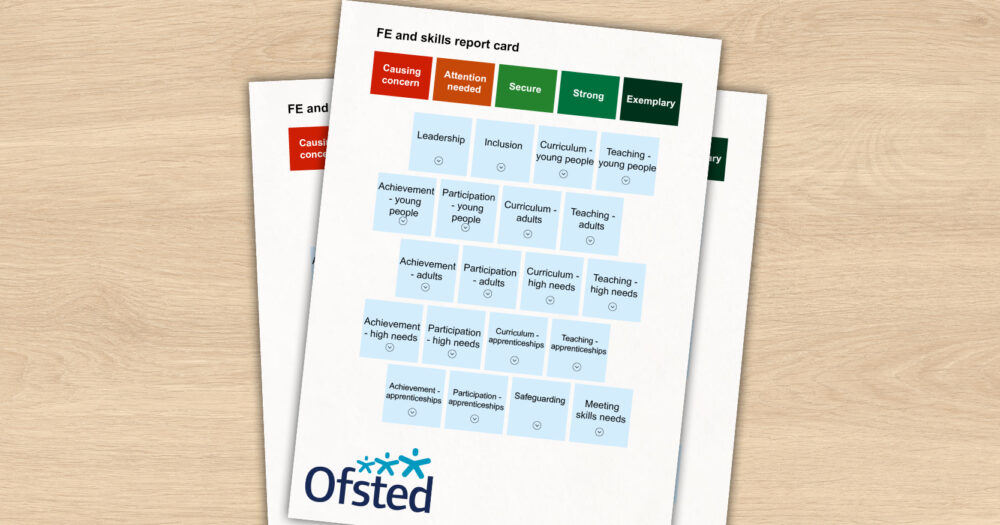Four in five further education leaders and teachers fear Ofsted’s new report cards will heap more pressure on the sector, a snap FE Week readers’ poll has suggested.
The inspectorate unveiled proposals this week to replace current inspection reports with a new system it deems will “provide a more nuanced view of a provider’s strengths and areas for improvement” from 2025-26.
While FE colleges and providers will no longer be subjected to overall headline grades, they will be judged on a colour-coded five-point grading scale from “exemplary” to “causing concern” across up to 20 areas – compared to a maximum of 10 under the current system.
Inspectors will place a bigger focus on staff wellbeing, workload, inclusion and achievement rate data.
Chief inspector Sir Martyn Oliver said: “We hope this more balanced, fairer approach will reduce the pressure on professionals working in education, as well as giving them a much clearer understanding of what we will be considering on inspection.”
But early critics have warned the increase in graded areas for FE providers will inevitably create a “greater risk of error” which is likely to lead to more complaints.
An FE Week survey of 250 sector leaders and teachers found 80 per cent think the reforms will actually increase pressure placed upon them by Ofsted, while just 15 per cent feel there will be a positive change.
One anonymous comment said: “All it achieves is one-word judgments in many more categories. The plan does not reduce pressure on anyone and the public will still find it difficult (if not more so) to understand. Feels like we are going backwards with all this.”

Ofsted’s reforms follow a “Big Listen” exercise that was prompted by a coroner’s ruling in 2023 that an inspection of Caversham Primary School in Reading “contributed” to the suicide of its headteacher, Ruth Perry.
Darren Hankey, principal of Hartlepool College, said: “I’m not sure what happened in the Big Listen, but it seems as though no listening took place and we’ve now potentially got a system which is more complex, less reliable and less valid than the one it replaced.
“The new system will do exactly what Ofsted says it doesn’t want to happen – add to leaders’ and staff workloads. At a time when we have staff recruitment and retention issues; this is just not on.”
Ofsted proposes to judge FE providers on seven headline areas: leadership, inclusion, safeguarding, curriculum, developing teaching and training, achievement, and participation and development.
The latter four areas will also receive one of the judgments for each of the following types of provision offered: education programmes for young people, provision for learners with high needs, apprenticeships and adult learning programmes.
Colleges will also continue to be judged on whether their contribution to meeting skills needs is ‘limited’, ‘reasonable’, or ‘strong’.
So for an FE college offering courses to young people, adults, apprentices and learners with high needs, this would see the number of grades they receive double from 10 to 20.
As well as headline grades for each area, Ofsted will publish short descriptions summarising their findings.
Half of the respondents to FE Week’s survey disputed Ofsted’s view that this approach would provide more nuanced information and put learners first.
Forty-five per cent said the proposals were “bad” for FE and skills, while 39 per cent said the reforms won’t make a difference.
One anonymous inspection nominee in an independent training provider said the plans were “a good idea in principle but too complicated with far too many categories”.
Gemma Baker, a senior policy lead for the Association of Colleges who is also an Ofsted inspector, said: “We do have concerns that the proposals will double the number of judgments made in a single inspection. This inevitably creates a greater risk of error which will make the post-inspection and complaints processes even more important.
“We are also concerned that the school and FE categories have diverged more in a way that could obscure proper judgments about 16-to-19 education quality.”
Hankey said the “biggest elephant in the room” regarding Ofsted was its “lack of reliability and validity”.
He added a “simpler approach” would be to report on what a college “does well, what a college needs to improve and, if serious concerns are found, stick around to help the college get better”.

















Your thoughts